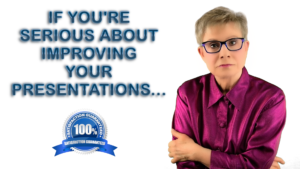Every day we are bombarded with more information than we can remember.

Whatever your role, you want your message to be remembered and repeated to others. When we do that, we are speaking to the audience of our audience.
In selling, managing, inspiring, leading, training, copywriting, in fact in all forms of communicating, we must look for techniques that help make our messages memorable to our audiences.
Before our colleagues, customers, partners, or audience members leave the meeting or presentation, we need to solidify our message or remind them of the action they need to take. Tying a powerful, repeatable message to stories or a major point gives you a “Phrase That Pays.” Story consultant and speech coach Doug Stevenson says, “A ’Phrase That Pays’ is a short phrase that summarizes your message. It is a call to action that tells your listener or audience member what you expect them to do.”
Your “Phrase That Pays” can also be called a “Foundational Phrase” or a “Sound Bite Statement.” The following are techniques that help to create or identify your memorable phrase.
When we remember vivid examples, we nearly always remember the associated lesson or message.
Here are three examples of ways you can develop your own “Phrase That Pays.”
-
The Two and a Half Men Technique
From popular culture, we quote commercials, lines from movies, and cartoons. The popular TV sitcom that lives on in reruns and still amuses us is Two and a Half Men. Many don’t realize that the unusual titles of the episodes always occur in the dialogue of one of the characters:
“Go East on Sunset Until You Reach the Gates of Hell.”

“If I Can’t Write My Chocolate Song, I’m Going to Take a Nap.”
“The Last Thing You Want Is to Wind Up with a Hump.”
“Did You Check with the Captain of the Flying Monkeys?”
“I Can’t Afford Hyenas.”
“Round One to the Hot Crazy Chick.”
“Back Off, Mary Poppins.”
“Can You Eat Human Flesh with Wooden Teeth?”
If you are like me, from the moment I begin watching I am waiting for the title to occur in the show’s dialogue. If you are a fan, you can probably even remember which character said each title. The actor’s dialogue amuses us and cements the scenes in the show. The brilliant writers know that the audience will go out and retell the storylines and the memorable phrases. The result is that we add to the show’s success with our word-of-mouth reviews and advertising.
How can this help you as a speaker? When you give others a catchy, repeatable catchphrase – something funny, powerful, or thought-provoking – your listeners will be eager to repeat it to others. When your power phrases are attached to your content and examples, you will create an ever-expanding network of people retelling your key messages.
-
The “Quote Others” Technique
Let the wisdom in your speech, training, or meeting come from the advice or dialogue of your characters, not from you. Reframe and emphasize your own key points with the pithy comments of others. They may be talking to you, or you may overhear something. Always give credit to whoever passed on their knowledge.
In my preparation to speak at a conference focused on getting employees to come up with good ideas, I interviewed Nancy. She had come up with an idea that made her company 18 million dollars. As part of the interview, two lines from that conversation were added to my speech and many others that followed. Nancy told me, “I am the only person in the history of our company who received an award for the same idea twice. You know, Patricia, it is a lot more difficult to come up with an idea that makes money than to save money.”
I asked Nancy what the awardees were given as a reward. Then, “Nancy, just between us, don’t you ever fantasize about being given 1% of the millions they made from your idea?” Nancy said, “Patricia, we do fine. It is such an honor and a privilege to work for a company that actually listens to what we say.”
When I opened my first business, I attended a leadership seminar. The seminar leader made a comment I have never forgotten and repeat frequently in my own seminars and speeches. It was as relevant decades ago as it is today. He said, “Your business is as good as your worst employee.”
I am reminded of two people who influenced how I run my business. On the first day I went to work, my father Arthur Fripp said, “Don’t focus on making a lot of money. Rather, focus on becoming the type of person others want to do business with, and you most likely will make a lot of money.”
Senator Garrett Richter who was in my audience when he was president of a bank said, “If you roll out the red carpet for a billionaire, they won’t even notice it. If you roll out the red carpet for a millionaire, they expect it. If you roll out the red carpet for a “thousandaire,” they appreciate it. However, if you roll out the red carpet for a “hundredaire,” they tell everybody they know.”
-
The “Repeat After Me” Technique

You can improve by yourself or Patricia Fripp can help.
Often it is helpful to give your audience the words to use when they repeat your message to their own team.
During a presentation on “Exceptional Customer Service” and using examples that incorporate “Two and a Half Men” or “Quote Others” techniques, you can help cement the ideas by recommending the following:
“When you leave this conference, you will be filled with enthusiasm and information that you’ll want to share with your team. After you tell them the best ideas for your company, say, ‘For the next few minutes, I would like you to tell me which ideas will be the most relevant to our company and how we can best incorporate them.’ As good leaders, you know your team will be more committed to the results if they help design the solution.”
This is how you can connect your entertaining stories to the reality of your listeners’ lives and businesses.
There are few new universal truths, however, there are endless ideas that can become fresh and powerful when aided by your stories and personal experiences and summarized in your “Phrase That Pays.”
These ideas will help you speak to be remembered and repeated. Patricia Fripp can help. Have a conversation.
“Patricia Fripp not only walks on water; she creates the water she walks on. She is truly a gifted and talented speech coach.” Chandra Williams, State Director of Training and Technical Assistance, Division of Specialized Education
“You are a true Rock Star executive speech coach! Every year you help me with my January Sales Meeting speech, my skills increase. Your guidance and input are invaluable. My boss told me my speech was outstanding. Thanks to you I was very confident, comfortable, and genuine.” Rob Cummings, Senior Vice President, Sales & Client Services, Fidelity Investments


Hi Pat, I learn so much from you, as a speaker myself you have been an incredible influence. Your opening saying ‘It never ceases to amaze me’ I have used many times. Wish you were coming to Brisbane OZ I would love to meet you. cheers John
You are very gracious! Nice to know people read what we create. Happy New Year. Fripp
As always, Patrcia, superb advice, superbly written! This is the very reason people should attend your speaking school!
Thanks for your kind comment!!! Hope all is going well. Fripp